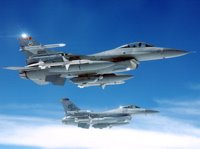Thinking back on this year's War
I make no secret of my appreciation of and downright affection for Mark Helprin, and not just because he happens to be my favorite novelist. His understanding of complex geopolitical issues is also second to none, as he makes clear in the definitive account of Israel's war on Hizb'allah of this past summer, available courtesy of the irreplaceable Claremont Institute.
First, some good news for civilized nations, in the form of bad news for the 'Palestinians':
For example, the war has been a strong argument for continued Israeli control of the Jordan crossings and the sea and air approaches to a Palestinian state, lest Qassems become Katyushas, and as such is Iran's gift to the Palestinians of yet another setback.
Will Ahmadinejad become any less of a hero to these poor, downtrodden souls? Don't count on it.
But in any case, the 'Palestinian cause" has ceased to matter a long time ago. As for the larger strategic picture, Helprin makes a point that should ease the minds of everyone concerned with the fate of Western civilization:
To the Iranian de facto declaration to Israel, the Arabs, and the West that it possesses a belligerent outpost on the Mediterranean, Israel has weathered world condemnation to reply that the rent for this outpost is high and can be made higher. When Iran spoke to Israel in the language of war, Israel spoke back with absolute clarity even if not with the mythical brilliance attributed to it by friend and foe alike. Which is not to say that it is incapable of fighting the stunning existential battles that once it fought. For it is indeed capable of them, and they are yet to come.
Indeed they are. But whence came this "mythical brilliance attributed to [Israel] by friend and foe alike"?
With the same kind of intellectual lethargy that led to the obligatory description of the proposed international force as robust (I hope never to hear the word again), people who do not pretend to knowledge of either the Arab-Israeli conflict or military affairs habitually declare that Israel is invincible. Insensitive to fact, variation, potential orders of battle, or the effects of nuclear weapons, they have been saying this since the Six-Day War of 1967. That war, the 100-hour 1956 Sinai Campaign, and the 1976 Entebbe operation are responsible for expectations that Israel produces miracles every time it takes to the field.
These decisive victories were a surprise to many, who were shocked that the Jews, whom the Russian Empire's Cantonist Decrees of the 19th century had subjected to 25 years or more compulsory military service, had a military tradition and could hold their own in battle. And thus the swing of the pendulum from irrational contempt to irrational awe.
Irrational because even in 1967, in a war that borders on the miraculous perhaps more than any other, the struggles for Jerusalem and the Golan were hard fought, costly, and closely run. Irrational because for Israel the 1948 War of Independence dragged on with high casualties and much destruction, and left it with borders that were a strategical nightmare. Irrational because the War of Attrition spanned several difficult years and brought Israel no gains whatsoever. Irrational because in the 1973 War Israel came perilously close to extinction. And irrational because none of the campaigns in Lebanon has been anything but slow and bloody, and collectively they have given birth not to miracles but to the Hezbollah garrison that in this war Israel was compelled to reduce.
Then again, there is a clear difference between Victory, as in 1967 or 1991, and "Victory", as claimed by the Arabs who, sadly for them, and luckily for the rest of us, have never tasted the former (unless one counts Sir John Glubb's taking of East Jerusalem for them):
And yet Hezbollah is part of a people who claimed on the eve of the 1967 War that, "If the Sixth Fleet intervenes in our struggle…we have the power to turn it into a can of sardines"; who, as their armies were being slaughtered in Sinai, danced in the streets of Cairo; and who, after fleeing Kuneitra without a shot, called it the greatest military action in history, "even greater than the Russian defense of Stalingrad." Theirs is hardly a sober or disinterested assessment, and we have no reason to take them at their word.
In the end, what matters is not how these people feel about it, but what they have learned, and how, in their opinion, Israel can still be blackmailed, threatened, and coerced. And on this account, not all is lost:
Hezbollah has proved that it can survive an Israeli campaign of small scale and limited duration, but it has also proved that this can destroy Lebanon, and that 10,000 carefully accumulated "strategic" weapons—in the main, glorified artillery rounds—were during four weeks of engagement less potent than one suicide bomber.
Which, when you think about it, is pretty pathetic for any delusional end-of-days cult, especially one that seeks to bomb the world into submission.
(Read it all.)








0 Comments:
Post a Comment
<< Home